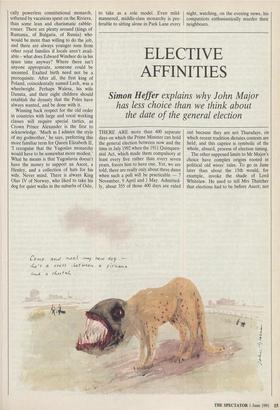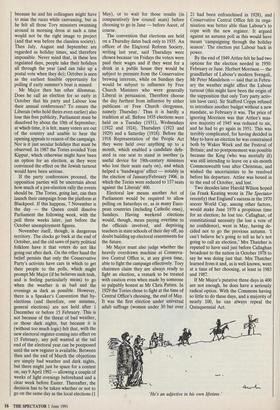ELECTIVE AFFINITIES
Simon Heifer explains why John Major
has less choice than we think about the date of the general election
THERE ARE more than 400 separate days on which the Prime Minister can hold the general election between now and the time in July 1992 when the 1911 Quinquen- nial Act, which made them compulsory at least every five rather than every seven years, forces him to have one. Yet, we are told, there are really only about three dates when such a poll will be practicable — 7 November, 9 April and 1 May. Admitted- ly, about 355 of those 400 days are ruled out because they are not Thursdays, on which recent tradition dictates contests are held; and this caprice is symbolic of the whole, absurd, process of election timing.
The other supposed limits to Mr Major's choice have complex origins rooted in political old wives' tales. To go in June later than about the 15th would, for example, invoke the shade of Lord Whitelaw. He used to tell Mrs Thatcher that elections had to be before Ascot; not because he and his colleagues might have to miss the races while canvassing, but as he felt all those Tory ministers swanning around in morning dress at such a time would not be the right image to project (and that was before the classless society). Then July, August and September are regarded as holiday times, and therefore impossible. Never mind that, in these less regulated days, people take their holidays all through the year (and can take up a postal vote when they do); October is seen as the earliest feasible opportunity for polling if early summer's boat is missed.
Mr Major then has other dilemmas. Does he call an election for so early in October that his party and Labour lose their annual conferences? To ensure the Liberals (who hold theirs even earlier) also lose this free publicity, Parliament must be dissolved by about the 10th of September; at which time, it is felt, many voters are out of the country and unable to hear the opening appeals to reason of the campaign. Nor is it just secular holidays that must be observed. In 1987 the Tories avoided Yom Kippur, which otherwise might have been an option for an election, as they were convinced the effect on the Jewish turnout would have been serious.
If the party conferences proceed, the opposition parties will be uncertain about how much of a pre-election rally the events should be. The Tories, going last, can then launch their campaign from the platform at Blackpool. If this happens, 7 November is the day — the Queen could dissolve Parliament the following week, with the poll three weeks later, just before the October unemployment figures.
November itself, though, is dangerous territory. The clocks go back at the end of October, and the old saws of party political folklore have it that voters do not like going out after dark. On the other hand the belief persists that only the Conservative Party's activists have cars in which to get their people to the polls, which might prompt Mr Major (if he believes such tosh, and is feeling particularly mean) to go when the weather is as bad and the evenings as dark as possible. However, there is a Speaker's Convention that by- elections (and therefore, one assumes, general elections) are not held after 1 December or before 15 February. This is not because of the threat of bad weather, or those dark nights, but because it is (without too much logic) felt that, with the new electoral register coming into effect on 15 February, any poll wanted at the tail end of the electoral year can be postponed until the new register is available. Between then and the end of March the objections are simply bad weather and dark nights, but there might just be space for a contest on, say 9 April 1992 — allowing a couple of weeks of light evenings beforehand and a clear week before Easter. Thereafter, the decision has to be taken whether or not to go on the same day as the local elections (1
May), or to wait for those results (in comparatively few council seats) before choosing to go in June — before Ascot, of course.
The convention that elections are held on a Thursday dates back only to 1935. An officer of the Electoral Reform Society, writing last year, said Thursdays were chosen because 'on Fridays the voters were paid their wages and if they went for a drink in a public house they would be subject to pressure from the Conservative brewing interests, while on Sundays they would be subject to influence by Free Church Ministers who were generally Liberal in persuasion. Therefore choose the day furthest from influence by either publicans or Free Church clergymen, namely Thursday.' Thus it is hardly a tradition at all. Before 1935 elections were held on a Tuesday (1931), Wednesdays (1922 and 1924), Thursdays (1923 and 1929) and a Saturday (1918). Before the 1918 Representation of the People Act they were held over anything up to a month, which enabled a candidate defe- ated in one seat to stand in another (a useful device for 19th-century ministers who lost their seats early on), and which helped a 'bandwagon' effect — notably in the election of January/February 1906, in which the Tories were reduced to 157 seats against the Liberals' 400.
Electoral law means another Act of Parliament would be required to allow polling on Saturdays or, as in many Euro- pean countries (including Catholic ones), Sundays. Having weekend elections would, though, mean paying overtime to the officials involved, and depriving teachers in state schools of their day off, no doubt building up electoral resentments for the future.
Mr Major must also judge whether the heavily overdrawn machine at Conserva- tive Central Office is, at any given time, able to fight the campaign effectively. Tory chairmen claim they are always ready to fight an election, a remark to be treated with caution even when made by someone so palpably honest as Mr Chris Patten. In 1929 the Tories chose to fight at the time of Central Office's choosing, the end of May. It was the first election under universal adult suffrage (women under 30 but over 21 had been enfranchised in 1928), and Conservative Central Office felt its orga- nisation was better able than Labour's to cope with the new register. It argued against an autumn poll as this would have meant 'campaigning through the holiday season'. The election put Labour back in power.
By the end of 1949 Attlee felt he had two options for the election needed in 1950: February or June. Herbert Morrison — the grandfather of Labour's modern Svengali, Mr Peter Mandelson — said that in Febru- ary the weather might affect the Labour turnout (this might have been the origin of the supposition that only Tory party activ- ists have cars). Sir Stafford Cripps refused to introduce another budget without a new mandate, so February it was. The price of ignoring Morrison was that Attlee's mas- sive majority of 1945 was reduced to six, and he had to go again in 1951. This was terribly complicated, for having decided in May to have an election he was constrained both by Wakes Week and the Festival of Britain; and no postponement was possible because the King (who was mortally ill) was still intending to leave on a six-month Commonwealth tour after Christmas, and wished the uncertainties to be resolved before his departure. Attlee was boxed in to the end of October, and lost.
Two decades later Harold Wilson hoped (as Frank Keating wrote in The Spectator recently) that England's success in the 1970 soccer World Cup, among other factors, would make June 1970 a propitious time for an election; he lost too. Callaghan, of constitutional necessity (he lost a vote of no confidence), went in May, having de- cided not to go the previous autumn. 'I can't believe he's going to tell us he's not going to call an election,' Mrs Thatcher is reputed to have said just before Callaghan broadcast to the nation in October 1978 to say he was doing just that. Mrs Thatcher learned from it and, as is well known, went at a time of her choosing, at least in 1983 and 1987.
If Mr Major's putative three days in 400 are not enough, he does have a seriously radical option. With the Commons having so little to do these days, and a majority of nearly 100, he can always repeal the Quinquennial Act.
'He's an adjective in his own lifetime.'



















































 Previous page
Previous page